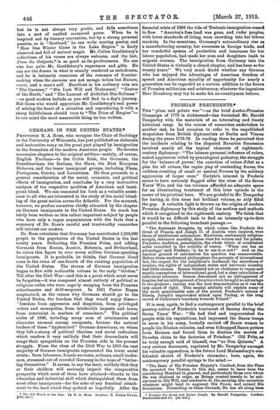GERMANS IN THE UNITED STATES.*
PROFESSOR E. A. Ross, who occupies the Chair of Sociology in the University of Wisconsin, has just published an elaborate and instructive essay on the great part played by immigration in the formation of the modern American people. He devotes successive chapters to the original settlers—mainly, of course, English Puritans—to the Celtic Irish, the Germans, the Scandinavians, the Italians, the Slays, the East European Hebrews, and the leaser immigrant groups, including Finns, Portuguese, Greeks, and Levantines. He then proceeds to a general consideration of the social, economic, and political effects of immigration, and concludes by a very instructive analysis of the respective qualities of American and immi- grant blood. We can commend his book as a valuable assist. ance to all who are interested in the study of the racial blend- ing of the great nation across the Atlantic. For the moment, however, we profess ourselves chiefly attracted by the chapter on German immigrants to the United States. So much has lately been written on this rather important subject by people who have only a vague acquaintance with the facts that a summary of Dr. Ross's careful and trustworthy researches will interest our readers.
Dr. Ross calculates that Germany has contributed 5,250,000 people to the population of the United States in the last ninety years. Deducting the Prussian Poles, and adding Germans from Russia, Austria, Bohemia, and Switzerland, he raises this figure to over seven million German-speaking immigrants. It is probable, he thinks, that German blood runs in the veins of one-fourth of the existing population of the United States. The stream of German immigration began to flow with noticeable volume in the early "thirties." Till after the Civil War—and this is a point which must never be forgotten—it was composed almost entirely of political or religious exiles who were eagerly escaping from the Prussian schoolmaster and drill-sergeant. In 1851 Pastor Bogen emphasized, as the reason why Germans should go to the United States, the freedom that they would enjoy there— "freedom from oppression and despotism, from privileged orders and monopolies, from intolerable imposts and taxes, from constraint in matters of conscience." The political exiles of 1848, including many men of attainments and character unusual among emigrants, became the natural leaders of these "hyphenated" German-Americans, on whom they left a stamp of political idealism and social radicalism which renders it very unlikely that their descendants will range their sympathies on the Prussian side in the present struggle. From the close of the Civil War to 1893 the vast majority of German immigrants represented the lower social strata : farm labourers, female servants, artisans, small trades. men, streamed out of crowded Germany in the hope of "better- ing themselves." It seems, to say the least, unlikely that they or their children will seriously imperil the comparative prosperity which most of them have attained—thanks to the education and industrial skill which distinguished them from most other immigrants—for the sake of any fanatical attach. merit to the land which they quitted so hopefully. After the
• Th. Ohl World to the New. Br E. A. Rona, London: T. Fisher Unwin. IISa null
financial crisis of 1 3 the tide of Teutonic immigration ceased to flow. "America's free land was gone, and ruder peoples, with lower standards of living, were crowding into her labour markets. In the meantime, Germany's extraordinary rise as a manufacturing country, her successes in foreign trade, and her wonderful system of protection and insurance for her labour population, bad made her sons and daughters loath to migrate oversee. The immigration from Germany into the United States is virtually a closed chapter, and has been so for twenty years." We very much doubt whether any German who has enjoyed the advantages of American freedom of speech and American equality of opportunity for nearly a generation can be regarded as a serious addition to the forces of Prussian militarism and aristocracy, whatever the ingenious Herr Dernburg may try to make his ex-countrymen believe.






































 Previous page
Previous page